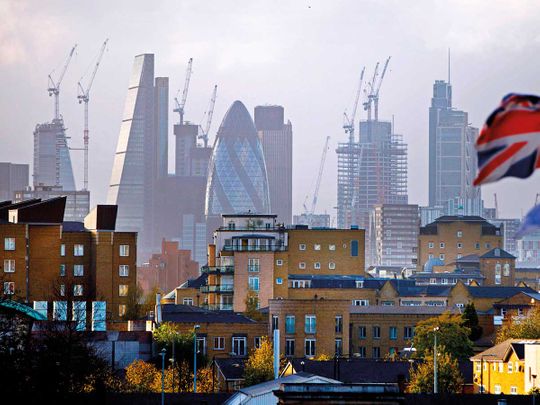
Rishi Sunak's government raised the salary requirement for people applying to live in the UK, one of a series of measures designed to show voters his ruling Conservative Party has a plan to deliver on its pledge to reduce net migration ahead of a general election expected next year.
Would-be migrants will need to earn 38,700 pounds ($48,900 or Dh179,574) to qualify for working visas, up from 26,000 pounds, Home Secretary James Cleverly said in the House of Commons on Monday. The aim is to reduce annual net immigration by 300,000 "in future years," he said, without setting out a precise timetable.
Other measures Cleverly announced include stopping overseas care workers from bringing family dependents, and ending the 20 per cent salary discount firms can pay compared with the going rate for workers on the government's shortage occupation list. That represents a major U-turn, after ministers added bricklayers to the list to help the construction industry just months ago.
Sunak has faced intense pressure from Tory MPs to come up with a plan to tackle surging immigration, after the Office for National Statistics said last week an estimated 672,000 more people moved to the UK than departed in the year ending June. Party strategists see immigration - and the government's failure to reduce overall numbers - as a key electoral issue.
Also included in Cleverly's plans:
Ministers have spent months talking about stopping asylum seekers arriving in small boats across the English Channel, one of five pledges Sunak has asked voters to judge him by. But the ONS numbers underscored how much the legal migration has changed since the decision to leave the European Union in 2016. For Tory MPs, the growing number represents a broken Brexit promise.
Since the UK left the EU, the Tory party can no longer attribute high migration numbers to free movement of people within the bloc. Instead, the vast majority of migrants arrive under government programs, including refugee visas for Ukrainians and Afghans, work visas such as those issued to health and social care workers or others on the shortage occupations list, and students.
Net migration in the year to June was entirely driven by non-EU nationals, with 768,000 more arriving than departing. That's up from 179,000 just four years ago. By contrast, there was net emigration of 86,000 among EU nationals.
"The British people will always do the right thing by those in need," Cleverly said. "But they also - and they are absolutely right to want to - reduce overall immigration numbers, not only by stopping the boats and shutting down the illegal routes, but by a well-managed, reduction in legal migration too."
Staff shortage and inflation fears
But Sunak faced an immediate backlash over fears the tougher rules would exacerbate economic headwinds caused by staff shortages and inflation. The new rules preventing migrants from bringing dependents triggered warnings from the social and health care sectors.
"These cruel plans spell total disaster for the NHS and social care. They benefit no one," UNISON union general secretary Christina McAnea said in a statement. "The government is playing roulette with essential services just to placate its backbenchers and the far-right."
Miriam Deakin, director of policy and strategy at NHS Providers, said the state-run health service already has staff shortages of more than 120,000, making measures that deter people from joining "deeply concerning."
Cleverly told lawmakers the government doesn't expect the new rule to create a staff shortage in the care sector, suggesting data shows applications will shift to people without dependents.
Officials estimate around 100,000 fewer visas for social carers and dependents, and 140,000 fewer from a previously announced change to the rules on students bringing in dependents that takes effect in January. The new measures announced by Cleverly will take effect in the spring.
Still, officials are also concerned the changes, which are due to come into effect in the spring, may induce a last-minute dash to enter the UK.
Meanwhile the opposition Labour Party zeroed in on the fact many of the measures Cleverly announced were reversing policies introduced by the Conservatives, including the shortage occupation salary discount.
The government also faced criticism because according to the ONS, net migration levels were already predicted to fall to about 300,000 a year in the coming years without additional measures.
'No plan, no grip'
There is "nothing in this statement about training requirements and workforce plans," said Yvette Cooper, Labour's home affairs spokeswoman. "They have no grip, no proper plan. This is a chaotic approach." Labour MP Neil Coyle told Cleverly his migration policy is being dictated by "Tory head-bangers."
Tory demands for action are especially strident among the self-described "New Conservatives," a right-wing caucus mainly holding seats in former Labour strongholds in the Midlands and the North that switched to the Tories in 2019. They say they were elected on a "solemn promise" to reduce migration.
"The solution is to employ British workers for British jobs. It's not that complicated," John Hayes, an ally of former Home Secretary Suella Braverman and an advocate of tougher immigration measures, told the BBC ahead of Cleverly's statement. He welcomed reports of the new measures. "We're seeing sense, we're doing the right thing by the British people," he said.
In the House of Commons, Cleverly won praise from a slew of Tory MPs. Neil O'Brien called it an "excellent package" and Edward Leigh called it "common sense." Tom Hunt told Cleverly he welcomed the move, though he added it's a "shame it's taken so long."








